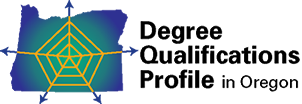DQP Work Plan Cover Memo
MEMORANDUM
TO:Community College and OUS DQP Project Teams
FROM:Ron Baker and Carol Schaafsma, Project Co-Coordinators
DATE:October 2012
RE:Institutional DQP Work Plan Outline
Welcome to the Oregon Degree Qualifications Project (DQP) Project! We are looking forward to working with you on this exciting and innovative pilot project. While the project has specific purposes, it has elements of common interest with, and builds upon, institutional work with other local and statewide initiatives. Your involvement in this project will benefit Oregon institutions, individually and collectively, while fulfilling the obligations of the project. This overview and the associated Work Plan Outline are intended to provide general guidance as you start your journey.
Broadly stated, the primary purpose of the Oregon DQP Project is to engage institutional constituencies in purposeful discussion and reflection on the meaning of their degrees. More specifically, the project is designed to use the DQP concept to create a flexible non-prescriptive curricular framework of essential meta learning outcomes that characterizes, and where possible aligns, overarching degree-level learning outcomes within and among Oregon’s two-year and four-year institutions. The results of this work will foster student success in Oregon by more clearly (1) defining and disclosing degree-level meta learning outcomes, (2) establishing strong articulations between and among Oregon postsecondary institutions to aid student navigation between institutions, and (3) documenting achieved outcomes for students seeking employment. Achievement of these objectives will be advanced through active participation in the following Oregon DQP Project initiatives:
Institutional Engagement
Using the DQP framework, institutions will create profiles of their current meta learning outcomes for their respective overarching degrees (AA, BS. etc.) and craft spider web diagrams that graphically represent discipline-specific degree outcomes (e.g., BA in History) or general education outcomes in relation to the meta outcomes of the degree qualifications profile.
Horizontal Alignment
Using the DQP as a guiding framework, community colleges and OUS institutions will work collaboratively to compare, and where possible, align common associate degrees (AA, AS, etc.) and common baccalaureate degrees (BA, BS, BAS, etc.) across institutions.
Vertical Integration
Using DQP meta outcomes as a guide, community colleges and OUS institutions will articulate relationships between, and where possible improve the alignment of, expectations for associate degrees and expectations for baccalaureate degrees to enhance student transition, progress, and completion as students move between degrees.
The secondary purpose of the project is to document and disseminate intra- and inter-institutional discussions, activities, and plans related to the beta test of the DQP framework. Information gather will inform colleagues in other states as they work to develop similar frameworks. Each participating institution is asked to identify an institutional historian to capture the institution’s “journey” through the DQP project. Institutions will track changes (if any) they make to their own outcomes, as well as changes they recommend in the DQP profile. These journals will be publicly available on the DQP website and used to create a record of the Oregon experience. The journals and artifacts of institutional work will be included in project reports and disseminated at conferences and in publications. They will also be entered into a searchable repository on the Oregon DQP website for use by faculty and other interested parties interested in Oregon’s work on degree-level engagement, collaboration, and policy development.

